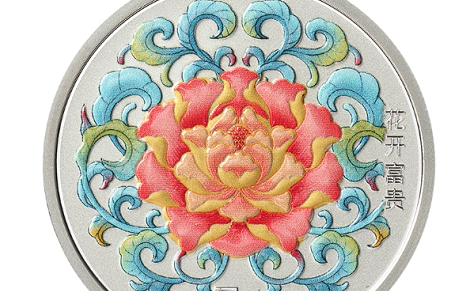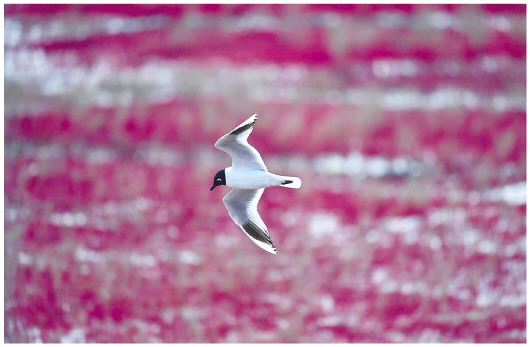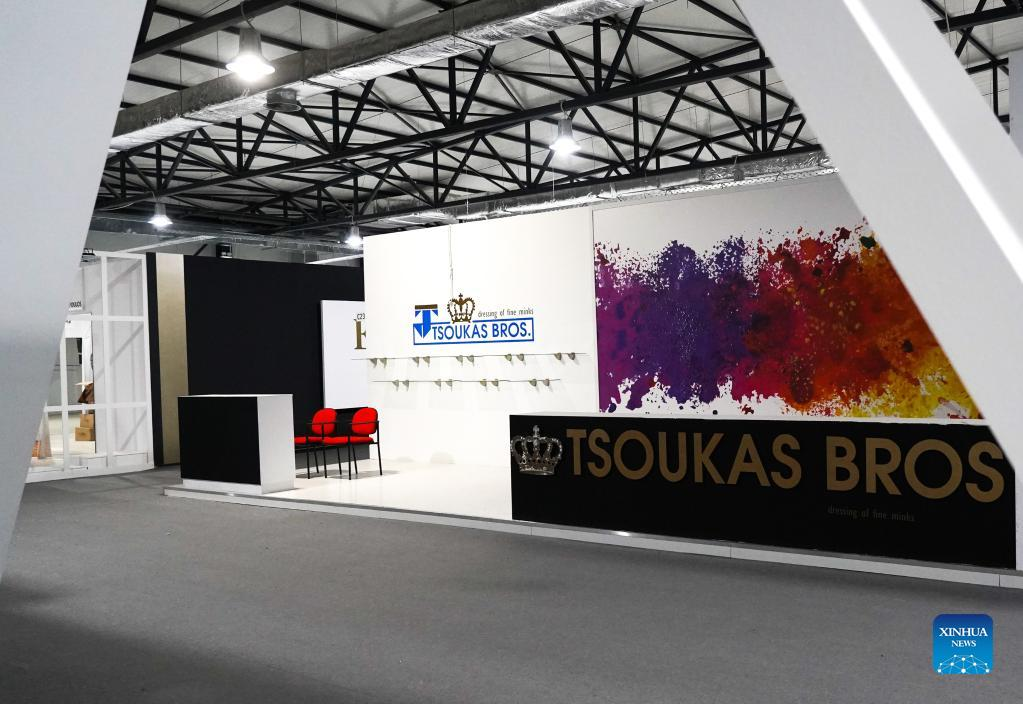Feature: Greece's fur industry hub hit hard in wake of Ukraine crisis
Photo taken on April 26, 2022 shows an empty exhibition center that used to host the Kastoria International Fur Fair in Kastoria, Greece. A bustling center of the fur trade for generations, Kastoria, a city in northern Greece, has been eerily quiet this spring. (Photo by Angelos Tsatsis/Xinhua)
KASTORIA, Greece, May 17 (Xinhua) -- A bustling center of the fur trade for generations, Kastoria, a city in northern Greece, has been eerily quiet this spring.
The fur traders' stores have been closed since mid-March and some 1,500 artisans are now out hunting for their next job on the Aegean islands before the summer tourist season kicks in, local businessmen told Xinhua in recent interviews.
The impact of the Russia-Ukraine conflict on Kastoria's fur industry has been devastating, as it is heavily reliant on exports to Russia, they said.
Dino Salagiannis, a second-generation trader in the family-owned business Ego Group SA, opened his shop only to show the unsold garments. The primary customers of his company were Russians in recent years.
Under the European Union's (EU) sanctions on Russia over the conflict in Ukraine, fur is listed among the luxury goods that can no longer be exported to Russia since March 14.
"When 90 percent of my sales are all of a sudden deemed illegal, something must be done," Salagiannis said.
Akis Tsoukas, president of the Hellenic Fur Federation, said that the local economy has lost approximately 200 million euros (212 million U.S. dollars) in the past two months alone.
Thousands of orders have been canceled, Russian clients cannot even pay off past dues and the first exhibition in three years local furriers were planning for this May has now been postponed to late summer.
"Thousands of workers are currently hanging on a thread and so are businesses. There is total destruction. We have no objectives anymore. Someone forbade us to sell. It is that simple," Tsoukas said.
"Someone should assume responsibility for this political decision. One cannot just say 'close down, do not sell.' What should I do? Where can I find customers?" he asked.
Currently, there are about 2,000 fur-related businesses in the area, Tsoukas explained. Their revenues have decreased from 165 million euros in 2019, before the outbreak of the COVID-19 pandemic, to some 80 million euros annually in the past two years.
According to the furriers' associations, the industry needs substantial support to survive the new challenges.
Salagiannis's family business, along with many other local dealers, had been trying to diversify their clientele and explore new opportunities to enhance cooperation with China and many other countries long before the outbreak of the conflict and the start of the pandemic, he explained.
They intensified their efforts in the wake of the Crimean crisis in 2014. But a shift like that takes time and in the past three years, there have been no international exhibitions where they could have showcased their products and attracted new customers.
The high quality and craftsmanship of furs made in Kastoria are a strong selling point of the local industry, but much more needs to be done for them to expand to new markets.
"To be in Kastoria is a competitive advantage primarily because we have skilled workers here. We also have dressing factories. And for this reason, we have all this hub of production, which is probably the last in Europe," Salagiannis told Xinhua.
For customers worldwide, Kastoria has been synonymous with Greek furs of high quality. Fur processing and trade in the region date back centuries and the industry there has weathered numerous storms.
"An entire society is living and breathing through the fur sector. We are talking about one of the most extroverted industries," Giannis Korentsidis, Kastoria's mayor, told Xinhua.
Half of the city's 35,000 residents are working directly in fur farming and trade, and about 40 percent are indirectly linked to the industry, he explained.
"We are following the developments with anxiety and concern. We hope the crisis will be over soon and that our businesses will be able to reopen," Korentsidis said, adding that he could not but remain optimistic.
 |
Photos
 China’s central bank to issue commemorative coins on cultural theme of auspiciousness, including two heart-shaped coins
China’s central bank to issue commemorative coins on cultural theme of auspiciousness, including two heart-shaped coins Population of endangered black-headed gulls exceeds 10,000 mark in NE China’s coastal city of Panjin
Population of endangered black-headed gulls exceeds 10,000 mark in NE China’s coastal city of Panjin China's self-developed floating airship breaks record
China's self-developed floating airship breaks record Chinese germplasm bank conserves biodiversity in warm temperate zone
Chinese germplasm bank conserves biodiversity in warm temperate zone
Related Stories
- Feature: Greek wineries eyeing China's growing market
- Greece's Piraeus port posts record high profit for 2021
- Feature: Greek gov't to further support households, businesses as energy costs skyrocket
- Swathes of Greece paralyzed for 2nd day after heavy snowfall
- Christmas decorations seen in Athens as festive season kicks off
Copyright © 2022 People's Daily Online. All Rights Reserved.







